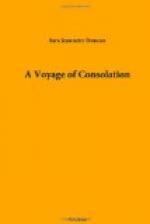how
do you do!” The gentleman was Mr.
Richard Dod of Chicago, known to our family without
interruption since he wore long clothes. Mr. Dod
had come into his patrimony and simultaneously disappeared
in the direction of Europe six months before, since
when we had only heard vaguely that he had lost most
of it, but was inalterably cheerful; and there was
nobody, apparently, he expected so little or desired
so much to see in Paris as the Senator, momma and
me. Poppa called him “Dick, my boy,”
momma called him “my dear Dicky,” I called
him plain “Dick,” and when this had been
going on for, possibly, five minutes, the older and
larger of the two ladies of the party swung round
with a majesty I at once associated with my earlier
London experiences, and regarded us through her
pince
nez. There was no mistaking her disapproval.
I had seen it before. We were Americans and she
was Mrs. Portheris of Half Moon-street, Piccadilly.
I saw that she recognised me and was trying to make
up her mind whether, in view of the complication of
Mr. Dod, to bow or not. But the woman who hesitates
is lost, even though she be a British matron of massive
prejudices and a figure to match. In Mrs. Portheris’s
instant of vacillation, I stepped forward with such
enthusiasm that she was compelled to take down her
pince nez and hold out a superior hand.
I took it warmly, and turned to my parents with a
joy which was not in the least affected. “Momma,”
I exclaimed, “try to think of the very last
person who would naturally cross your mind—our
relation, Mrs. Portheris. Poppa, allow me to
introduce you to your aunt—Mrs. Portheris.
Your far distant nephew from Chicago, Mr. Joshua Peter
Wick.”
It was a moment to be remembered—we all
said so afterwards. Everything hung upon Mrs.
Portheris’s attitude. But it was immediately
evident that Mrs. Portheris considered parents of
any kind excusable, even commendable! Her manner
said as much—it also implied, however, that
she could not possibly be held responsible for transatlantic
connections by a former marriage. Momma was nervous,
but collected. She bowed a distant Wastgaggle
bow, an heirloom in the family, which gave Mrs. Portheris
to understand that if any cordiality was to characterise
the occasion, it would have to emanate from her.
Besides, Mrs. Portheris was poppa’s relation,
and would naturally have to be guarded against.
Poppa, on the other hand, was cordiality itself—he
always is.
“Why, is that so?” said poppa, looking
earnestly at Mrs. Portheris and firmly retaining her
hand. “Is this my very own Aunt Caroline?”
“At one time,” responded Mrs. Portheris
with a difficult smile, “and, I fear, by marriage
only.”
“Ah, to be sure, to be sure! Poor Uncle
Jimmy gave place to another. But we won’t
say anything more about that. Especially as you’ve
been equally unfortunate with your second,”
said poppa sympathetically. “Well, I’m
sure I’m pleased to meet you—glad
to shake you by the hand.” He gave that
member one more pressure as he spoke and relinquished
it.




